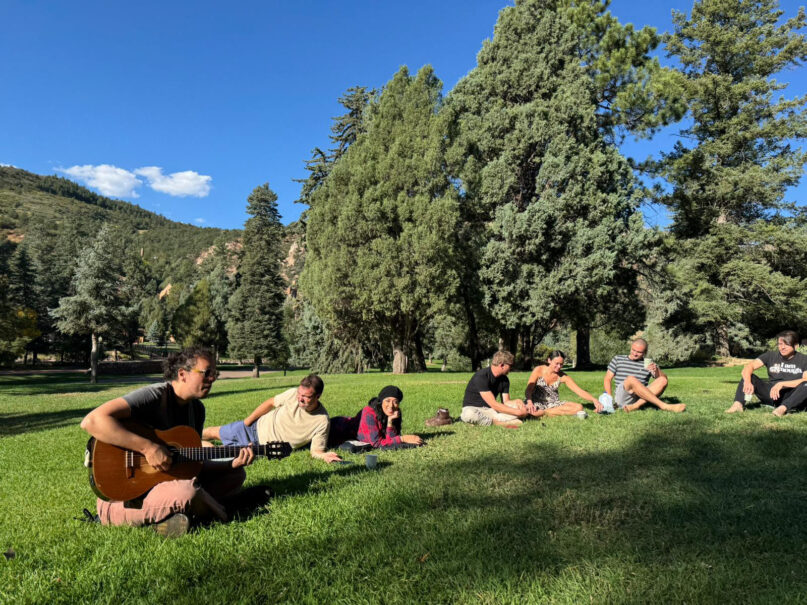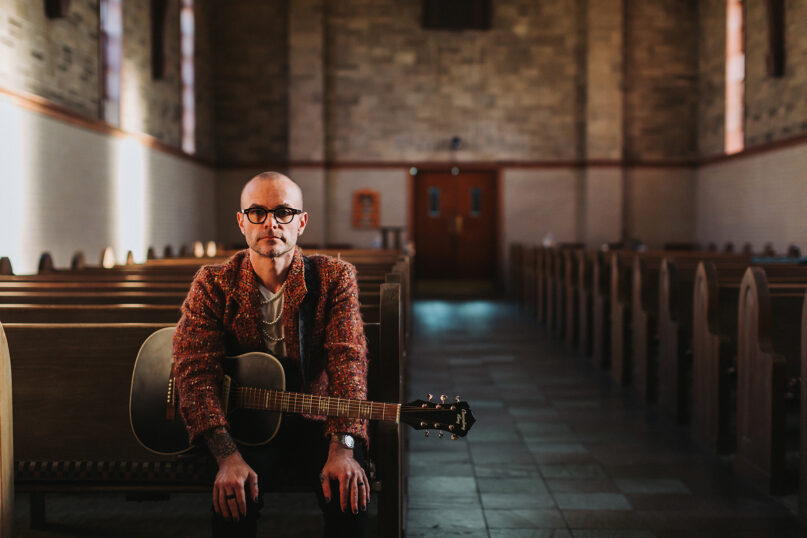(RNS) — When former Christian artist Michael Gungor first hosted a new spiritual community in Los Angeles this year, worship began not with an organ blast or sermon series video promo, but with blowing bubbles.
Appropriately dubbed “Play,” Gungor envisioned the event — which featured painting, dancing, corporate singing and meditation, but no religious creed — as a celebration that “redefines worship.”
“I want to be in a room and see each other’s eyes and smell each other and hear each other singing out of key. This is something we’ve always done as a species,” Gungor said. “I think there’s something important, really grounding and human about it.”
Gungor’s idea of worship wasn’t always so experimental. In packed churches and concert venues, thousands once sang along to the band Gungor’s 2010 hit “Beautiful Things,” a song that became a permanent fixture on the setlists of youth group bands. But in 2014, Gungor’s critiques of the Christian music industry — as well as his public musings on Genesis as a poem rather than historic fact — led to his exclusion from the Christian music business. Now, after a long process of wrestling with his inherited evangelical faith — documented on his podcast “The Liturgists” — Gungor says he’s more interested in embracing the current lived moment than being tethered to a set of religious beliefs, though he describes Christianity as his “native tongue.”

Michael Gungor. (Video screen grab)
For those like him who have “deconstructed” — a popular term today for the process of questioning and sometimes letting go of the teachings of one’s faith tradition — Gungor still sees a desire for ritual and for communal gathering. He recognizes the power of the collective — and aims to write non-dogmatic music for corporate, if not religious, worship.
“We’ve gotten rid of some of the shame-based stuff and some of the dogmas that were oppressing and hurting a lot of us, but now we’re kind of just wandering around alone … What are we missing? Is there anything we can find back here?”
In the last two decades, several Contemporary Christian Music powerhouses — Audrey Assad, DC Talk’s Kevin Max, Hawk Nelson’s Jon Steingard, among several others — have publicly exited the CCM industry. For many of these musicians, questioning the industry’s theological parameters meant becoming unwelcome in mainstream CCM spaces. Years later, after interrogating their beliefs, a handful of these onetime CCM artists are revisiting faith in some fashion, trying on elements they’d previously discarded and writing music for listeners who might be more spiritual than religious. In many ways, these artists’ break from institutional Christianity and hunger for a broader form of belonging exemplifies national religious trends.
One of the earliest CCM artists to publicly depart the industry was Jennifer Knapp, who burst onto the Christian music scene with her debut album “Kansas” in 1998. But while Knapp was drawn to Christianity’s teachings on human dignity and divine love, she soon realized that the Christianity promoted in the CCM world drew hard lines around who belonged, and who didn’t. Her lyrics about the Christ’s humanity and questions about the necessity of substitutionary atonement — the idea that Jesus died as a substitute for humanity — began to draw criticism.
“I was already getting critiqued at the time and being basically told you weren’t a Christian anymore,” said Knapp. “And then I was like, oh, well, I’m wondering what you guys are going to think about my sexual orientation.”
In 2002, Knapp “pushed the eject button” on the Christian music scene and her faith. When she returned in 2010, it was as an openly gay musician no longer publishing music under the Christian banner.

Jennifer Knapp in 2024. (Courtesy photo)
For longtime Bethel Music recording artist William Matthews, it was in part the rigid homogeneity of the Christian Music industry that ultimately led him to walk away. Raised in a Black Church of God context, he came to Christian music by way of spontaneous worship models promoted by Morningstar Ministries in Charlotte, North Carolina, and the International House of Prayer in Kansas City, Missouri. Though skeptical about the existence of hell, Matthews, who spent his evenings watching Bill O’Reilly on Fox News, largely felt at home in the prophetic corner of the Christian music world. In the early 2010s, he led worship at the conferences of charismatic leader Lance Wallnau, now known for his pro-Trump prophecies.
But by 2015, Williams found non-violent Christian theology a more compelling approach. He watched as anti-immigrant rhetoric and opposition to the Black Lives Matter movement reached a fever pitch in evangelical circles and grew frustrated with what he saw as the Christian music industry’s “conservative bias.” After spending nearly 15 years thinking he’d been bridging cultures as one of the only Black people in white-majority evangelical spaces, he was shattered to discover that many of those he’d grown close to seemed ambivalent toward racism.
“That led me to really walk away from Christian music,” said Matthews.
He attributes the CCM industry’s apparent conservative slant to its target audience of “white, suburban, Midwest or Southern moms.” In catering to that demographic, Christian radio executives and Christian bookstores are known to censor songs or albums that cross conservative theological or political boundaries.

The Mystic Hymnal Songwriter’s retreat at the Glen Eyrie Retreat Center in Colorado Springs, Colorado, in late Sept. 2024. (Photo courtesy Michael Gungor)
“What the CCM industry, or Christian music, is selling is security,” said musician Derek Webb, founding member of the Christian rock band Caedmon’s Call. “The people who run or appear to be gatekeeping the CCM industry are not doing that as a means of holding some kind of moral plumb line.” Webb believes the pushback usually has more to do with a company’s bottom line than personal convictions.
Despite the Christian music industry’s restrictions, exiting the industry often means leaving behind record labels, the Christian music festival circuit and radio play and requires promoting music to a market that’s much less defined. While some boundary-pushing Christian artists like Semler and Flamy Grant, two queer artists who’ve scored top spots on the Itunes Christian charts, have found success via social media and streaming platforms, many onetime Christian artists are labeled “too Christian” for mainstream music spaces and “too secular” for explicitly religious ones.
“It’s this kind of no man’s land, algorithmically,” said Gungor. “I still have more listeners of ‘Beautiful Things,’ than anything else I make.”
Creating music for a more nebulous spiritual audience might not guarantee commercial success, but if it means creating music that feels authentic, for many former Christian artists, it’s worth the tradeoff.
Known for his provocative approach to songwriting, Webb says his lyrics cause him to both “shed” about a quarter or third of his audience every 18 months and gain new listeners. After 30 years in the music industry, he’s comfortable with the ebb and flow. In 2017, three years after his divorce from fellow Christian artist Sandra McCracken, Webb released “Fingers Crossed,” an album documenting his departure from Christianity. But though he still considers himself an agnostic, his latest album, “The Jesus Hypothesis,” grapples more explicitly with Christian themes.

Derek Webb. (Photo by Emily Tingley)
“I wanted to go back into the rubble of where all this was pulled down and burned down, and where I was in here with an ax before, I want to come back in with a scalpel,” he said of the album.
Webb’s return to the debris of his Christian faith coincided with a return to Caedmon’s Call, which recently produced a re-record of its self-titled debut album in honor of its 25th anniversary. The 2022 release is emblematic of the ways several former Christian artists have been coming back to reclaim elements of their religious heritage.
More than a decade since her return to the music world, in May, Knapp offered a re-release of her first album, “Kansas 25.” She graduated from Vanderbilt Divinity School in 2018, and now views Christianity as a source of wisdom whose teachings on liberation have fueled her own LGBTQ+ advocacy. The outpouring of support for “Kansas 25,” Knapp said, caused her to see her early music in a new light.
“If ever I had any bitterness about my role inside of evangelical Christianity, or concern that maybe I tied people down, exposed them to too much religious trauma because of the conservative evangelical space that I came from, this was a real joy to be able to witness, that our faith can teach us something, and it can expand beyond some of the harms sometimes that our smaller religious spaces offer to us,” said Knapp.
Gungor’s next project has emerged from his desire to see communal songs that trade religious lyrics for more universal themes, like love and unity. This fall, he gathered with over 20 other songwriters in Colorado for a songwriting retreat to begin writing and recording music for the project, called The Mystic Hymnal.

William Matthews. (Photo by Lina Khatib)
After a long hiatus from Christian music, William Matthews, too, is releasing new, honest songs about spirituality. Earlier this year, he was invited by the evangelical authors of a recent anti-culture war statement to write and produce a corresponding album intended to call the church out of political idolatry. Titled “Return to Love,” the September album was recorded by artists from a range of theological and political perspectives and is designed for those who are “full of faith or struggling to believe.”
“I’m always in the middle of wrestling. Does church even matter to my life?” said Matthews, who leads worship at a progressive LGBTQ-affirming church in Los Angeles where former evangelicals regularly attend. “I will say, in my life, I’ve somehow always managed to come back. Maybe it’s cyclical. You’re always returning home or to a sense of home or to a better expression of home.”















